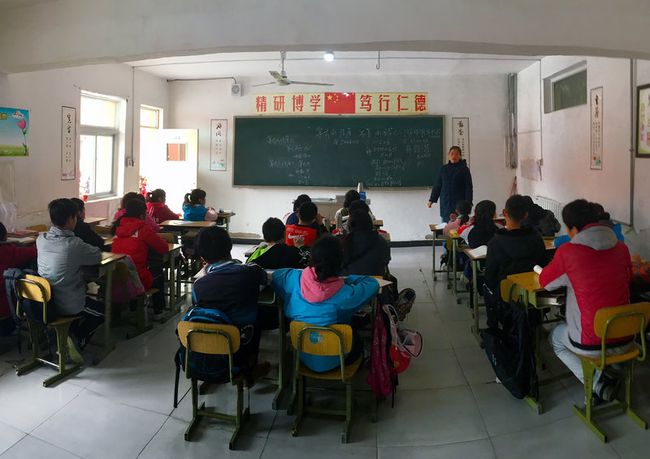In Chinese Cities, Migrants' Work Is Welcome. Their Children Are Not-中国的大城市,欢迎外来务工人员,并不欢迎他们的子女
November 16, 20175:03 AM ET
Heard onMorning Edition
Alyssa Edes
Children whose parents have migrated from elsewhere in China sit in a classroom at a private school in Beijing. They are officially still citizens€� of the rural areas their families come from and noteligiblefor public education elsewhere.
父母是外来人员的孩子们正坐在北京的一个私立学校的教室里。他们都是来自农村,没有资格上正规的公立学校。
Alyssa Edes/NPR
Tucked into a small side street in the Changping District just north of Beijing, a school stands out in bright, childlike colors — orange and green. Cheerful music plays between classes as students stream into the courtyard to play.
在北京北部的昌平区的一条小街上,一所橙色和绿色的学校特别突出,欢快的音乐穿插在课堂和孩子们玩耍的操场之间。
The school, like many in China, is for migrant children — serving those who are barred from Beijing's public schools. It is unlicensed and living a precarious existence, like many of the migrants themselves. Officials could order it to close at moment's notice. The principal asked us not to name it or its teachers for fear of drawing government attention.
像许多在中国的学校一样,他们是那些被禁止进入北京的公立学校的农民工子女服务。它没有执照,过着不稳定的生活,就像许多农民工一样。政府可以命令它立即关闭。校长要求我们不要给学校或老师起名字,以免引起政府的注意。
"You can see this street — all of the buildings on the south side have been taken down," says Molly, a volunteer teacher who asked us not to use her full name. "And when school[s] close, they don't have a place to go."
“你可以看到这条街——南面的所有建筑都被拆除了,”茉莉说,他是一名自愿者教师,要求我们不要使用她的全名。当学校关闭时,孩子们就不知道有什么地方可去。”
Migrants in China have traveled to cities for work by the hundreds of millions, and while their work has powered much of China's swift development, their legal situation is in some ways similar to undocumented immigrants in the United States. Although they have not crossed an international border, their moves from the countryside to cities can put them on the wrong side of government rules and regulations.
数以亿计的外来务工人员前往城市工作,而他们的工作成为了中国的飞速发展的强劲动力,在法律上,从某些方面类似于在美国没有合法文件的移民(偷渡)。虽然他们没有越过国界,但他们从农村到城市的行动可能会把他们置于政府规章和条例的反面。
They are not allowed to permanently relocate without providing extensive documentation and paying fees most can't afford. Even though some 8 million migrants live in and around Beijing alone, many don't have access to public services — including health care or education — because they are supposed to get them in their hometowns.
不提供大量的文件和支付大量他们可能承担不起的费用时,他们是不被允许落户的。尽管约有800万名移民独自居住在北京附近,但许多人不能获得北京的公共服务,包括医保或教育,因为他们应该在家乡得到这些服务。
"All of the public schools are for local people," says Molly. "We call that thehukou."
茉莉说:“所有的公立学校都是为本地居民准备的,我们称之为户口。”
Hukouis China's rigid household registration system, in which a person's residency is tied to the place where their family is from. Because it's difficult and expensive to gain residency in the city, many migrant students must enroll in private schools.
户口是中国严格的户籍制度,将个人住所与他们的家庭所在位置联系在一起。因为在城市居住很困难也很昂贵,许多外来人员的学生必须进入私立学校就读。
Periodically the government has cracked down on these schools as part of a widespread "urban rectification" program to control Beijing's booming population — which has soared to 21 million despite government discouragement — leaving students and teachers alike in limbo.
政府定期对这些学校采取严厉措施,作为城市改造计划的一部分,以控制北京蓬勃发展的人口,尽管人口已经猛增到2100万,但政府的措施使学生和教师都在地狱的边缘。
Some people who do have localhukou, like Molly, have mixed feelings about the crackdowns.
有些人有本地户口,像茉莉,对于管制百感交集
"I see more and more people coming into Beijing causing all the trouble here like traffic and air pollution," she says. "So the city's trying to get people to leave ... and I don't know if that's the right way, but I know it needs to be done."
她说:“我看到越来越多的人来到北京,造成了这里的交通问题和空气污染。所以这个城市试图让人们离开…我不知道那是不是正确的方法,但我知道这是需要做的。
Another teacher named Helen says through an interpreter that she was working at a migrant school nearby until earlier this fall, when the government ordered it to shutter. She and fifteen of her third-grade students had to transfer to the Changping school.
另一位名叫海伦的老师通过翻译说,她一直在附近的一所外来人员子弟学校工作,直到今年秋天早些时候,政府命令关闭它。她和她的十五个三年级学生必须转到昌平的学校。
"All the teachers and students scattered and they need to find their own place," the interpreter says. "When they were expelled, she felt like the city is excluding the migrants."
“所有的老师和学生都将离开,他们需要找到属于自己的地方,”翻译说。当他们被驱逐时,她觉得这个城市不欢迎这些外来人员。
Helen herself is a migrant, coming to Beijing from Inner Mongolia with her 10-year-old daughter. Despite the instability she says it's better to stay than go back to herhukou,because she has a better chance of finding work here.
海伦本人是一名移民,她带着10岁的女儿从内蒙古来到北京。尽管不稳定,她说比回到户籍地,这里会更好,因为在这里,她能找到更好的工作机会。
Her daughter came with her to the new school. When asked what kind of future she wants for her daughter, Helen's voice cracks and her eyes mist, but she never breaks eye contact.
她女儿和她一起去了新学校。当问到她对女儿有什么样的未来时,海伦的声音沙哑了,她的眼睛模糊了,但她并没有回避。
"She doesn't really hope her daughter becomes something — she hopes her daughter can be just happy," the interpreter says. "All she wants for her daughter is happiness. That's the priority."
“她真的不希望女儿变成什么样子,她希望女儿能快乐,”翻译说。她对女儿唯一的愿望就是幸福。这是最重要的。”
Will she have opportunities to become happy in the future, a reporter asked?
记者问:将来她有机会变得快乐吗?
"I think so," the interpreter says as Helen laughs. "Because she studies very hard."
“我想是的,”海伦笑着说。“因为她学习非常努力。”
Morning Edition editor Miranda Kennedy and Isabelle Li contributed to this report.
“本译文仅供个人研习、欣赏语言之用,谢绝任何转载及用于任何商业用途。本译文所涉法律后果均由本人承担。本人同意平台在接获有关著作权人的通知后,删除文章。”
原文来自 NPR
